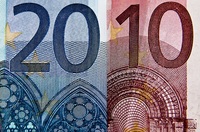The Year It Was - A Look At The European Auto Industry in 2010
Pal Negyesi
European Editor
Budapest Bureau
The Auto Channel
Happy New Year to all of our readers around the world, in 2011 we are all looking forward to exciting automotive news and events here in Europe…and we will be there to keep you informed.
Looking back at 2010, this was the year when:
- An electric car was elected Car Of The Year
- Both major Swedish automobile brands changed owners - one of them ended up in the grasp of an up-and-coming Chinese carmaker
- Both Western and Central European new car markets shrink at an enormous rate following the end of their scrappage schemes
- Russia started to roll again - thanks to their generous scrappage scheme
- Opel lost a truckload of money
ALT FUEL NEWS
Nissan Leaf Elected As Car Of The Year in Europe: Carlos Ghosn scored a major victory, when the Nissan Leas was elected as 2011 Car Of The Year in Europe.
This was followed by more good news for Nissan in December, when the British government announced the first list of those electric cars, which are eligible of a subsidy of GBP 5000 (about US $7900) and the Nissan Leaf was among them.
The UK Government has pledged 43 million pounds ($68.24 million) until the end of March 2012 to help British motorists shift to low-carbon vehicles. Other cars on the list include the Mitsubishi's iMiEV and its badge-engineered Peugeot and Citroen versions, the iON and CZero, plus the Tata Vista electric vehicle; the Toyota Prius Plug-in, and two of GM's finest offerings: the Chevrolet Volt and its Vauxhall Ampera sibling. More cars will be announced next year.
The Renault-Nissan Alliance needed this boost, as they are banking on an electric future, with plenty of electric Renault models scheduled to hit the market from the 2nd half of 2011.
Saab Goes Down The Drain, Volvo's On A Roll
By January, 2010 it became apparent that Spyker, a boutique automobile manufacturer from The Netherlands won the race to acquire ailing Swedish carmaker, Saab. Within a few months, it also became apparent that Spyker was over-optimistic when it planned to shift 60,000 Saab cars this year. It will be closer to 40,000 units. A miracle is needed to fulfill next year's plan of 80,000 units, not to mention 120,000 units in 2012.
On the other hand, Volvo is on a roll. It reported a profit for the 3rd quarter of 2010 and its new Chinese owner, Geely will help them to conquer the local market. Though reports out from China suggests that Geely will have problems with its financial backers - municipial governments, who would like to see Volvo plants on their territory -, but the potential is enormous. Stefan Jacoby, a former Mitsubishi and Volkswagen executive was elected as CEO earlier this Summer. He will steer Volvo to a new direction, which will see the Scandinavian company moving slightly away from the premium market.
Scrappage (Cash for Clunkers in U.S.) Scheme Here And There
European new car dealers are suffering mightily, but European car makers are happy. This sounds like a contradiction, but in reality it is not. The end of scrappage schemes in many Western and Central European countries left the new car market in tatters. Though the UK government tries to subsidize sales of electric cars, this project has yet to get off the ground. So with shrinking markets everywhere, dealers are agonizing.
But most of the European car makers, including the ever-stronger Volkswagen Group are boosted by good business outside Europe, notably in China. China is now the most important market in the world, where all automobile manufacturers are jostling for space. Chinese domestic brands are now joining the race, with new, sophisticated models.
Russia returned to its glory days. In November new car sales rose an incredible 80 per cent, thanks to a rebounding economy and the extension of the government backed scrappage scheme program. Sales may reach 1.9 million units this year, which is “significantly beyond any previous forecasts,” David Thomas, chairman of the Association of European Businesses automobile-manufacturers committee, said in a statement. Hyundai is the market leader, with General Motors, Ford and Renault-Nissan are not so far behind. Renault-Nissan is absorbing mighty AvtoVAZ, little by little. If AvtoVAZ will be fully integrated into the Renault-Nissan empire, it will be even bigger news, than any electric car-related happenings.
FIAT
For many years Fiat bashing was the order of the day. It produced inferior-quality cars, which were quite unattractive. But now under the steady hand of Sergio Marchionne, Fiat is enjoying something of a renaissance - and it was able to take over Chrysler. We are all waiting to see how the mini-sized 500 sells in the States .
Opel Is One Sick Puppy
There's nothing wrong with Opel's current models. Its Insignia (aka Buick Regal) is a popular and well-built car, while the new Astra can hold its own against the Volkswagen Golf, Focus and the likes. But Opel lacks an entry-level model and its sole CUV offering comes from South Korea. Though there's a city car, called the Agila which is built by Suzuki in Hungary, it is not as sophisticated or as roomy as any other offering in its segment. Not to mention the fact, that Opel can only export a limited number of cars to China, where other GM subsidiaries, including GM Daewoo enjoy a very healthy business. So far Opel was forced to close its plant in Belgium, while its new restructuring plan is under way.
For the latest and most relevant European automotive news in 2011 make sure you visit The Auto Channel ‘s European edition every day, again Happy 2011 and thanks for a good 2010.



